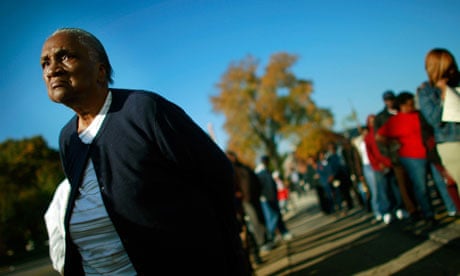The cornerstone of the Declaration of Independence – that all men are created equal – is being undermined by a rash of restrictive laws that force US citizens to endure long journeys, eccentric opening hours and hidden costs before they can vote, a new study finds.
The research, by the Brennan Center for Justice within New York University, finds that almost 500,000 eligible voters are being required to travel more than 10 miles to a government office – even though they have no car. More than 1 million eligible voters below the federal poverty line are now expected to pay costs of up to $25 before they can vote.
Thereport looks at the impact of voter ID laws that have been introduced since 2011 in 10 states that require US citizens to obtain a government-issued photo identification card before they can cast their ballot.
Proponents of the new laws claim they are needed to combat fraud and that they impose no burden on citizens because ID cards can easily be obtained free of charge.
But the Brennan Center report gives the lie to that claim, exposing the many different ways in which hundreds of thousands of Americans will find it harder to vote. The burden falls particularly harshly on poor and black communities where transport and public services are limited.
One in 10 eligible voters lack the government-issued photo ID cards they now need within the 10 states before they can cast their ballot. Yet the Brennan Center found that of those, more than 10 million people live more than 10 miles away from the nearest public office where they can obtain such cards.
They might make the journey, only to find the office closed. Some offices maintain hours that can only be described as bizarre. The office in Sauk City, Wisconsin opens only on the fifth Wednesday of any month – a quirk of the calendar that happens only four times this year, in February, May, August and October.
By federal law, the photo ID cards have to be provided free. Yet in order to persuade the authorities to issue a card, citizens often have to produce a birth certificate that can cost up to $25, or, in the case of married women whose birth certificate contains a maiden name, a marriage license at up to $20.
"Every American citizen should have the opportunity to vote, but these restrictive laws could make it harder for hundreds of thousands to exercise that right," said Sundeep Iyer, co-author of the Brennan Center report.
The barriers to voting erected in the 10 states – Alabama, Georgia, Indiana, Kansas, Mississippi, Pennsylvania, South Carolina, Tennessee, Texas and Wisconsin – are not just an inconvenience for the thousands of people caught by them. They are also potentially politically significant in the presidential election year.
The 10 states between them hold 127 of the 270 electoral college votes that Barack Obama or Mitt Romney must win in November to take the presidency. All 10 states are politically controlled by Republicans.
The issue has also become a legal hot potato, with challenges by the US justice department and civil rights groups leading to major court cases in several states. Last week Texas challenged the Obama administrationin a federal court in Washington in an attempt to overturn a justice department block on its voter ID law.
In closing arguments, the lawyer for the government, Matthew Colangelo, told the three federal judges that the law placed a burden on poor and minority communities. He called the requirement of a government-issued photo card "a new barrier that will disenfranchise voters the day it goes into effect".
The Brennan Center report provides evidence that supports the government's case. It shows how the new laws will have be especially onerous for poorer people, and for black and Hispanic communities.
About one in four African Americans do not have the recognised photo ID cards, and one in six Hispanics, compared to one in 10 of the general population.
Lack of transport is another burden that falls unequally on poor and minority ethnic communities. Several of the states that have adopted voter ID laws also towards the bottom of the national league table in terms of the amount they invest in public transport. Alabama has the distinction of being the 50th state – it does not provide any funding for public transport. Georgia and Mississippi come next, both investing less than a dollar for each of their citizens per year.

Comments (…)
Sign in or create your Guardian account to join the discussion